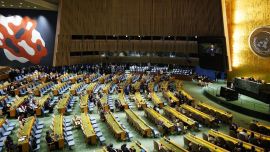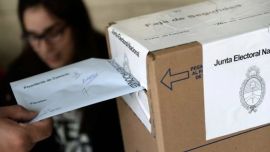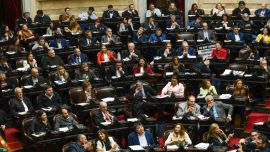Argentina is planning to marginally loosen the share of reserve requirements that commercial banks must report daily, in a bid to gradually provide more liquidity and revive lending, according to a person familiar with the matter.
The Central Bank’s committee, which is meeting on Thursday, is looking to ease the rule requiring full daily compliance with reserve maintenance, the person said, asking not to be named because the information isn’t public. Banks will be allowed to meet 95 percent of the daily requirement, down from a current 100 percent. The underlying reserve ratios vary by deposit and instrument.
A Central Bank spokesman declined to comment.
The adjustment would aim to give banks more flexibility in managing their liquidity, since calculating exact daily balances is difficult and the current rule prompts them to hold excess reserves to avoid steep penalties.
The change follows months of lobbying by banks through industry groups, seeking relief to cut funding costs and protect profitability. Central Bank officials had told bank executives they would ease the rules once Sunday’s legislative elections were over.
Investors already anticipated some policy shift on the horizon.
“Over the medium term, policymakers are expected to gradually unwind the emergency reserve requirement hikes on sight deposits,” Walter Stoeppelwerth, chief investment officer at Grit Capital Group, an Argentine brokerage, said in a note to clients Thursday. “The evidence is stark: the liquidity is dangerously tight.”
Still, unwinding the liquidity controls looks to be going at a slower pace than how policy makers quickly ratcheted up requirements in recent months. It’s a noticeably smaller concession than banks had requested. Lenders, which faced a liquidity squeeze as the government sought to curb a run on the peso as markets convulsed ahead of midterm elections, had been asking officials to shift from daily back to monthly reserve compliance.
Interest rates on peso assets briefly reached triple-digit levels in both money and capital markets before the election. Profits tightened, and shares of major lenders slumped. Core banking activity also softened as the economy slowed and delinquency rose to the highest since the pandemic. Virtually all banks suspended mortgage lending.
The Central Bank seems to be taking a more cautious approach, given the easing of requirements injects more pesos into the economy and could destabilise the currency. On Wednesday, Argentina’s Treasury said it rolled over less than 60 percent of local debt coming due in an auction, meaning a fresh batch of pesos is about to hit the market.
related news
by Ignacio Olivera Doll, Bloomberg





















Comments